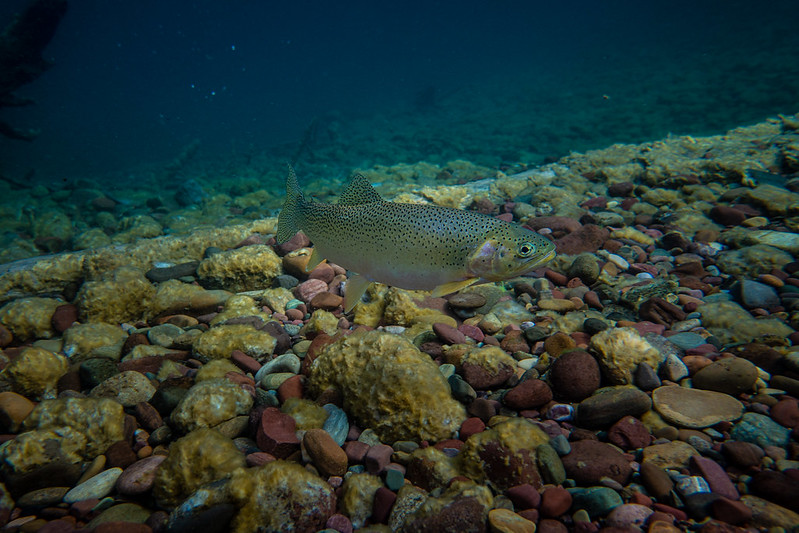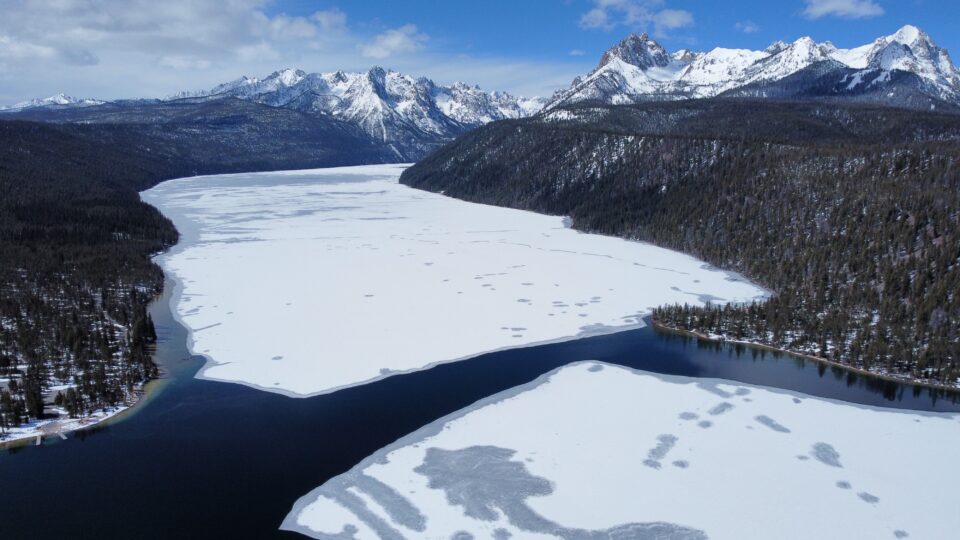Being from Florida, I never had to worry about freezing temperatures. Since moving West, experiencing snow, ice, frost, slush and sleet has been an adjustment to living in a climate like this. I’ve realized the cold isn’t always fun to deal with. It is something you have to plan for and handle. This got me thinking about how different residents of the Sawtooths survive our bitter winters. While I was familiar with avian migration and mammalian hibernation, I had no clue what our local fish did. Little did I know this annual challenge is one of luck.

Photo Credit: “Cutthroat Trout” by GlacierNPS is marked with Public Domain Mark 1.0.
The key to surviving winter in a freshwater environment is finding a stable one. Since fish are cold-blooded, activity needs to decrease as their core temperature drops. A reduction in activity corresponds with a lower metabolism, allowing them to go longer without eating. This is important because food availability also drastically decreases. However this colder state reduces their ability to respond quickly to change.
Fish become stressed and mortality can increase when they have to respond to change. This includes evading predators, moving as ice shifts, and adapting to fluctuating water temperatures. Stable environments have the least amount of change and provide ample opportunities to rest. Ideal wintering environments include deep pools and underwater roots or rocks. Fish may end up congregating in schools in places with ideal conditions. This schooling behavior also helps avoid predation as fish are harder to single out.
While overwintering fish can survive a range of cold temperatures, water at 39.2° F is ideal. Water is its densest at this temperature. This water sinks and stays at the bottom under the insulating ice, creating a reliable environment for the fish. This deep water can stay warm throughout the winter if adjoining water tables are high because mixing groundwater remains warmer than the waterways they feed. Beaver dams help create ideal overwinter conditions because it raises the local water temperature and provides many small nooks to rest in.
Stable ice is also important. Shifting, moving ice poses a threat to fish overwintering. In shallow environments, fish can get trapped as ice moves, or expend valuable energy as they move to avoid ice. A good sheet of ice also traps heats as it insulates lower waters from frigid outside air. Water exposed to air as ice moves decreases water temps, putting stress on fish metabolic patterns.

Redfish Lake melting off in spring. Photo Credit: SIHA by permission of Daniel Thomet
While activity decreases during winter, fish still need food and oxygen, and limited oxygen can be a major threat. Oxygen dissolves into the water over summer through plants photosynthesising and wind mixing with water. A drop in photosynthesis and the sealing of the lake by ice limits oxygen until spring. If there is not enough oxygen, mass die off, or “winterkill,” can occur. This usually isn’t a problem in the Sawtooths but algal blooms from excess nutrients, like those coming from human waste, can lead to this event.
Prolonging stored calories is also extremely important. While food may occasionally float by, any ice fisherman knows, winter fish don’t eat often. This means fish are drawing from stores of fats and proteins as they winter. Like most species, fish consume excess calories in the spring, summer, and fall to use over winter. Calm, reliable waters, where each day is as stable as the last, increases the odds of surviving unpredictable winters. While we wait for spring bundled and warm in our homes, remember the fish, enduring for the future under the ice.
Sources
https://oceanservice.noaa.gov/facts/fish-freeze.html
https://vermontriverconservancy.org/news/what-do-fish-do-in-the-winter
https://www.ausableriver.org/blog/how-do-fish-survive-winter-rivers-and-streams
https://www.canr.msu.edu/news/a-look-below-the-ice-at-fish-behavior
Cush is a returning naturalist who spent this last winter teaching elementary students in Southern California. On a clear night you can find him star gazing and listening for owls.